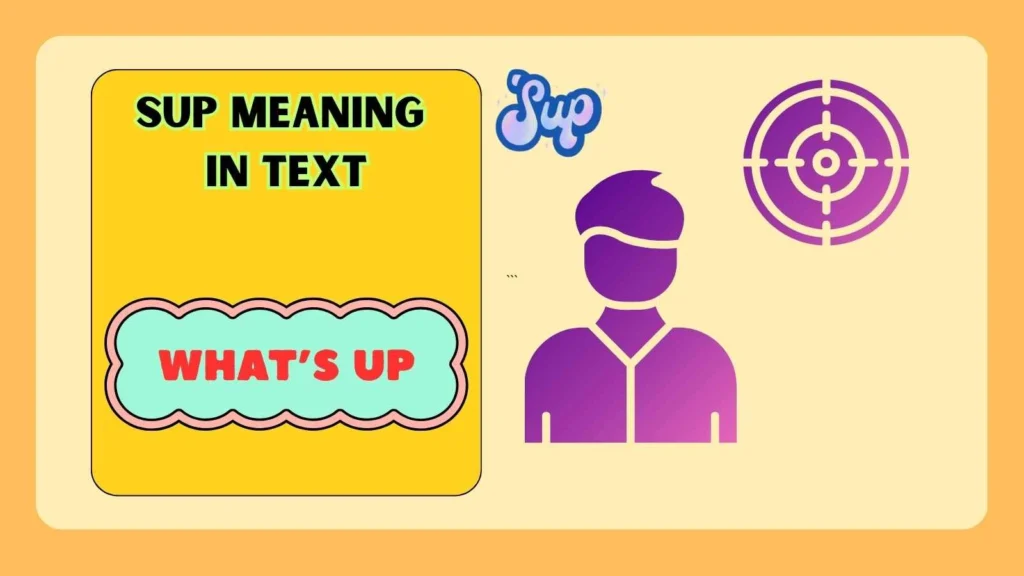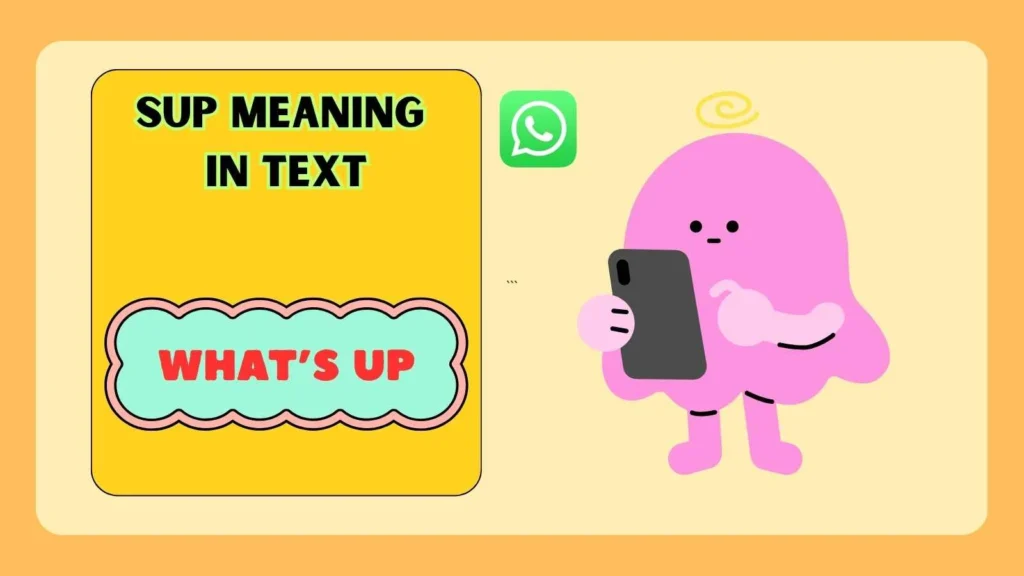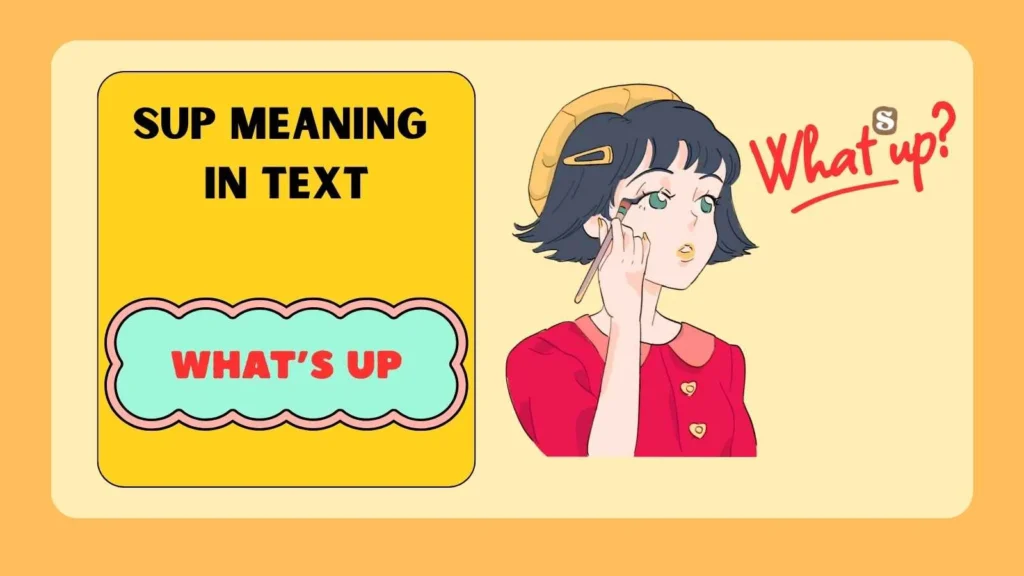Last updated on November 12th, 2025 at 09:07 pm
If you’ve ever received a message that just says “Sup”, you’re not alone in wondering what it really means. This short, casual term pops up everywhere from texts and DMs to memes and TikTok comments. But what does “sup” mean in text exactly, and how should you respond to it?
The term is part of modern digital slang, loved for its simplicity and laid-back tone. Whether it’s a greeting, a flirtatious opener, or just a way to start a conversation, “sup” fits right into Gen Z and Millennial online culture. People search for its meaning because it can express friendliness, curiosity, or even interest — all with just three letters.
In this article, we’ll break down everything you need to know about “sup,” including its origins, different uses, and how to reply like a pro.
Definition & Meaning
In simple terms, “sup” is a slang abbreviation of “What’s up?” — a casual greeting used to ask how someone is or what they’re doing. It’s not meant to start a deep conversation but rather to open one.
In texting, “sup” often replaces “hi” or “hey.” It’s a relaxed, friendly way to initiate small talk without sounding too formal. For example:
- Friend: Sup bro?
- You: Not much, just chilling.
Depending on the context, “sup” can mean:
- A casual hello between friends.
- A flirty icebreaker when chatting with someone new.
- A check-in to see how someone’s doing.
Essentially, “sup” is the digital age’s version of “hello,” designed for quick, effortless communication.
Background & History
The term “sup” originated as a spoken contraction of “what’s up” in the early 20th century. It gained traction in casual American English, particularly in urban and hip-hop culture during the late 1980s and 1990s.
As texting became mainstream in the 2000s, the word transitioned naturally into online communication. Platforms like AIM, MSN Messenger, and later, Snapchat and Instagram, helped make “sup” a staple of digital conversation.
Its popularity lies in its brevity — it’s easy to type, easy to read, and perfectly conveys a chill vibe. Today, “sup” is widely used across generations but remains most popular among younger audiences who value informal, minimalist communication.
In essence, “sup” evolved from a spoken slang term into a universal online greeting, symbolizing a modern way of saying, “I’m thinking of you what’s happening?”
Usage in Various Contexts
“Sup” can take on different shades of meaning depending on where, how, and to whom it’s used.
1. Friendly Chat:
Used between friends as a light greeting or casual opener.
- “Sup man, long time no see!”
2. Flirty Text:
When used in dating apps or messages, it can be a subtle, low-effort flirt.
- “Sup 😉” can hint interest or playfulness.
3. Group Conversations:
In group chats, it’s often used to start a conversation with everyone.
- “Sup everyone, what’s the plan for tonight?”
4. Social Media:
People use it in comments or captions to invite interaction.
- “Sup world 🌍” or “Sup TikTok fam?”
5. Gaming or Online Communities:
Gamers and streamers use “sup” to greet audiences or teammates casually.
- “Sup chat?” or “Sup squad?”
Its adaptability is what keeps it relevant across so many online spaces.
Common Misconceptions & Clarifications
Despite its popularity, “sup” is sometimes misunderstood. Let’s clear that up:
- Not always flirty: While “sup” can be used in flirting, it’s not inherently romantic.
- Not rude: Some interpret it as lazy or impolite, but in casual texting culture, it’s completely normal.
- Not formal: Avoid using “sup” in work emails or professional environments — it’s too relaxed.
- No need for punctuation: Writing “Sup?” or just “Sup” is both acceptable.
So, context matters. How you send it and to whom determines the tone.
Similar Terms & Alternatives
If you’re tired of saying “sup,” try these alternatives:
- “Hey”
- “Yo”
- “What’s good?”
- “How’s it going?”
- “Wassup” (a playful, extended form)
- “Howdy” (more regional)
Each version has its own energy. “Hey” sounds friendly, “Yo” feels urban, and “What’s good?” leans cool and confident. But all serve the same purpose to start a casual interaction.
How to Respond to This Term
Your response to “sup” depends on the sender and your vibe. Here are examples:
- Friendly: “Not much, you?”
- Funny: “Trying to figure out the meaning of life 😂”
- Flirty: “Just waiting for your text 😉”
- Neutral: “Hey, just chilling.”
Keep it short and conversational. Matching the tone helps maintain the flow of the chat without making things awkward.
Regional or Cultural Differences
“Sup” is primarily used in American English, but it’s understood globally thanks to pop culture and social media.
In the UK, people might say “You alright?” instead. In Australia, it could be “How ya going?” But the intent is the same — a casual greeting.
While “sup” is widely accepted in online communities, it may sound too informal in certain cultures where politeness or formal greetings are the norm. Always consider the context and relationship before using it.
Comparison with Similar Terms
| Term | Meaning | Tone | Common Use |
|---|---|---|---|
| Sup | What’s up? | Casual | Texting, chatting |
| Wassup | What’s up? (playful) | Friendly | Urban or slang-heavy talk |
| Yo | Hey/Hi | Cool, confident | Quick greetings |
| Hey | Hello | Neutral | Universal use |
| Hiya | Hello (soft) | Friendly | UK/Australia |
| Heya | Friendly greeting | Warm | Informal chats |
“Sup” stands out for being short, cool, and versatile, making it ideal for digital-age communication.
Usage in Online Communities & Dating Apps
In online spaces, “sup” often acts as an icebreaker. On Reddit, Discord, or gaming chats, users use it to start or revive discussions.
In dating apps like Tinder or Bumble, “sup” can feel too minimal if sent without context. While it’s casual, many people prefer something more personalized like:
- “Sup, you seem fun — what’s your favorite coffee?”
So while “sup” is approachable, adding personality keeps it from sounding lazy or uninterested.
Hidden or Offensive Meanings
Unlike many slang terms, “sup” is not offensive or vulgar. It’s neutral and widely accepted. However, its tone can be misread as disinterested if used alone, especially in romantic or first-time conversations.
The only “hidden” aspect is in tone perception — a plain “sup” might come off as too dry or dismissive. Emojis or punctuation can help soften it:
- “Sup 😄” feels friendlier than “Sup.”
Suitability for Professional Communication
“Sup” has no place in formal or professional messaging. It’s overly casual and may seem unprofessional in:
- Business emails
- Client chats
- Academic settings
Instead, use:
- “Hello”
- “Hi [Name], hope you’re doing well.”
- “Good morning/afternoon.”
Save “sup” for casual, friendly, or social exchanges — never corporate ones.
💬 Sup Meaning in Text from a Guy

- 😎 “Sup” is short for “What’s up?”, a casual greeting or check-in.
- 💭 When a guy texts “Sup,” he’s often starting a light conversation.
- ❤️ It can mean he’s interested and wants to keep things casual yet friendly.
- 👋 Sometimes, it’s just a simple hello without deeper meaning.
- 😏 Tone matters — with flirty emojis, it might show romantic interest.
- ⚡ Used by guys who prefer laid-back texting styles.
- 🧠 He may be testing your response to see if you’re open to chatting.
- 💬 It’s often used to keep the vibe cool and easygoing.
- 😂 In friendly chats, “Sup” shows comfort and informality.
- ✨ Overall, it’s a casual opener, not a serious question.
📱 Sup Meaning in WhatsApp

- 💬 On WhatsApp, “Sup” keeps conversations short and direct.
- 🔔 It’s a go-to message when someone wants to start small talk quickly.
- 😊 Often used among friends or close contacts for casual check-ins.
- 🌍 Universally recognized, making it easy across different countries.
- 🕒 Because WhatsApp is chat-based, “Sup” saves time and effort.
- 📲 It can lead to longer conversations once the other person replies.
- 💭 Sometimes it’s just a friendly notification ping without much intent.
- 😎 Younger users use “Sup” more often than formal greetings.
- ⚡ Emojis like 👋 or 😅 make it sound warmer and more natural.
- ✨ Perfect for WhatsApp groups — it’s quick, casual, and attention-grabbing.
💭 Sup with You Meaning in Chat
- 💬 “Sup with you?” means “What’s up with you?” or “How are you doing?”
- 😎 It’s a casual way to ask about someone’s day or mood.
- ⚡ Common in friendly or flirty texting conversations.
- 💭 It shows interest in the other person’s life or current situation.
- 😂 Usually follows when two people already know each other well.
- 📱 It replaces longer phrases like “How have you been?” or “What’s new?”
- 🧠 Depending on tone, it can be playful or genuinely curious.
- ❤️ In flirty chats, it helps build connection without sounding too forward.
- 👀 Adding emojis like 😉 or 😜 makes it sound fun and personal.
- ✨ “Sup with you?” keeps texting light, warm, and conversational.
FAQs:
What does “sup” mean in text?
It means “What’s up?” — a casual way to say hello or ask how someone is.
Is “sup” slang?
Yes, it’s modern slang used for informal digital communication.
Can “sup” be flirty?
It can be, depending on the tone and context.
How do I respond to “sup”?
Keep it casual: “Not much, you?” or “Just chilling.”
Is it okay to say “sup” in professional messages?
No, it’s too informal for business or work-related communication.
What’s the difference between “sup” and “wassup”?
“Wassup” is a longer, more playful version of “sup.” Both mean the same thing.
Conclusion
“Sup” might be short, but it carries a big cultural punch. It’s the digital age’s version of a smile and a wave simple, universal, and effortlessly cool.
Whether it’s a friendly check-in, a casual opener, or a flirtatious spark, it captures the laid-back tone of modern texting perfectly.
Just remember to use it wisely it belongs in informal chats, not professional emails. Next time someone texts you “sup,” you’ll know exactly how to decode it and respond like a pro.
